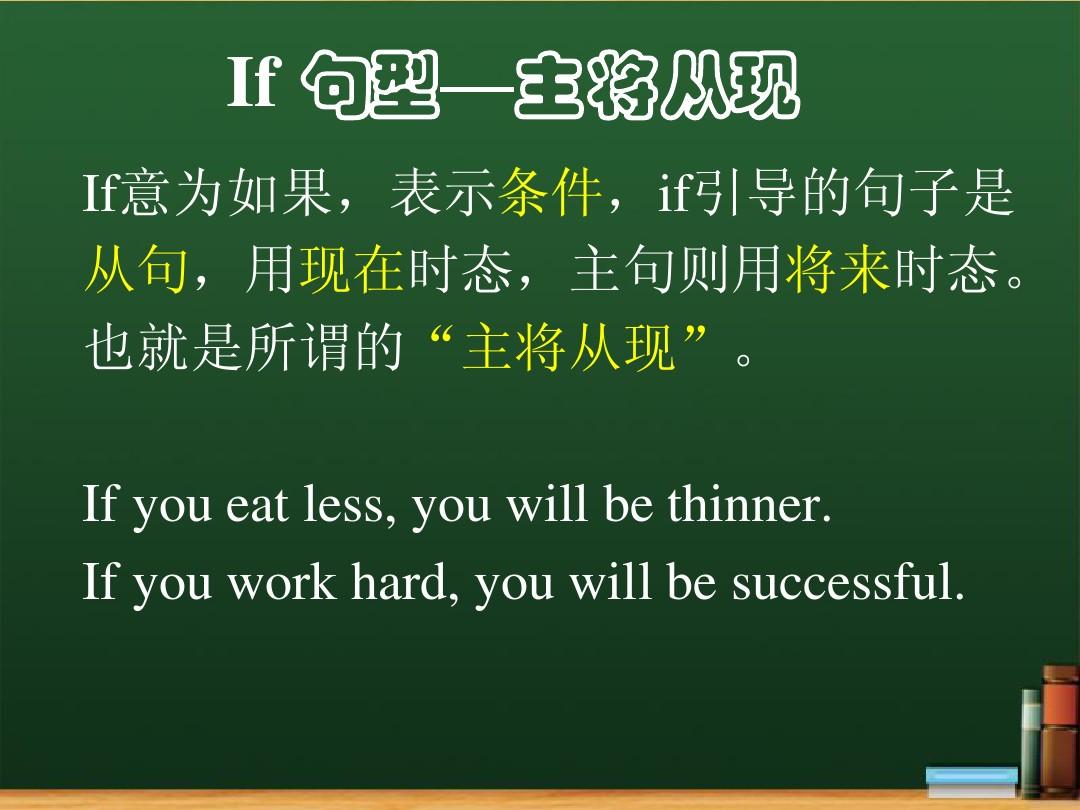主將從現是指在時間狀語從句、條件狀語從句和讓步狀語從句中,如果主句是一般將來時,從句用一般現在時替代一般將來時。是一種英語語法。
基本介紹
- 中文名:主將從現
- 含義:從句用一般現在時替代一般將來時
- 常用於:英語
- 類型:英語語法
解釋,構成,原則,
解釋
常見的有以下六種情況:
一、如果主句是將來時或表示將來含義時,那么條件和時間狀語從句多用一般現在時
如: When I grow up, I will be a nurse and look after patients/ I want to be a nurse and look after patients.
我長大後要當一名護士,照顧病人。
二、如果主句是祈使句,那么從句通常要用一般現在時
如:Don’t laugh at me when I make a mistake.
我犯錯誤的時候不要笑話我。
三、如果主句是含有情態動詞的一般現在時,根據需要從句多用一般現在時
如:You should be quiet when you are in the reading room
在閱覽室時應保持安靜。
四、 如果if的條件狀語從句遇到變換間接和直接時 , 祈使句套用not to....
如:“Don'tclose the window if the rain stops,” she said.
→She said not to close the window if the rain stops.
常見的時間狀語從句的連詞有:as soon as,when,while ,as,until等
五、主將從現說的是在含有時間狀語從句和條件狀語從句的主從複合句中,如果主句的時態是一般將來時,那么從句要用一般現在時。
例如:I will tell him about it when he comes.
If it is fine tomorrow, we will go outing.
六、如果主句的時態是過去將來時,那么從句要用一般過去時 。例如:
He said that he would have another try if he had the chance.
I knew he could help me if he was free the next day.
主要標誌有:if 、unless 、until、 when 、as soon as等
構成
If引導的條件句(if翻譯成"如果"的時候)
Ⅰ.(if 從句) 主句
v./ v.三單 will+v.
Ⅱ. if+sb+v./ v.三單 can+v.
某事很可能發生,條件是可能存在的,主句中某種情況發生的機率也是很高的。如:
If you ask him,he will help you.如果你請他幫忙,他會幫你的。
If you fail in the exam,you will let him down.如果你考試不及格,你會讓他失望的。
If you have finished the homework, you can go home.如果你作業做完了就可以回家了。
另外,if從句還表示不可實現的條件或根本不可能存在的條件,也就是一種虛擬的條件或假設。從句多用一般過去時或過去完成時,表示對現在或過去的一種假設。如:
If I were you,I would invite him to the party.如果我是你,我會邀請他參加聚會。
I would have arrived much earlier if I had not been caught in the traffic.要不是交通堵塞,我本會來得早一些。
另外你還要注意if 條件句的時態搭配:
1.if從句用一般現在時,主句用一般將來時
If he runs he’ll get there in time. 如果他用跑的,他就會及時趕到那兒。
The cat will scratch you if you pull her tail. 如果你拉貓的尾巴,它就會抓你。
2.if從句用一般現在時,主句用may/might/can
If the fog gets thicker the plane may/might be diverted. 如果霧再大一些,飛機可能就會改在別的機場降落。
If it stops snowing we can go out. 如果雪停了,我們就可以出去。
3.if從句用一般現在時,主句用must/should
If you want to lose weight you must/should eat less bread. 如果你想減肥,你必須少吃麵包。
4.if從句用一般現在時,主句用一般現在時
If you heat ice it turns to water. (也可用will turn)如果把冰加熱,它就會化成水。
5.if從句用現在進行時,主句用一般將來時
If you are looking for Peter you’ll find him upstairs. 如果你是在找彼得,上樓就會找到他。
6.if從句用現在完成時,主句用一般將來時
If you have finished dinner I’ll ask the waiter for the bill. 如果你吃完了,我就叫服務生來結賬。
原則
分別主句與從句:簡單而言主句就是問題的中心所在。一個句子的中心意思體現在主句中。所以判斷主從關係要從意思入手。或者根據引導詞來看,引導詞的後面是從句。定語從句主要修飾名詞與代詞.主要關係詞有;who whom whose which that when where why表語從句置於連繫動詞後面做表語。
時間狀語從句 when, whenever, while, as, before, after, since, till, once, as soon as,etc.
地點狀語從句 where,wherever
原因狀語從句 because, since, as, for, now that, etc.
目的狀語從句 in order that, so that, that, etc.
結果狀語從句 so…that, so that, such…that, that, etc.
條件狀語從句 if, unless, as(so)long as, etc.
讓步狀語從句 though, although, even if, even though, however, whatever, as,etc.
比較狀語從句 as…as, so…as, than, etc.
方式狀語從句 as, as if, as though, etc.
條件狀語從句中,如果主句是一般將來時,從句要用一般現在時

